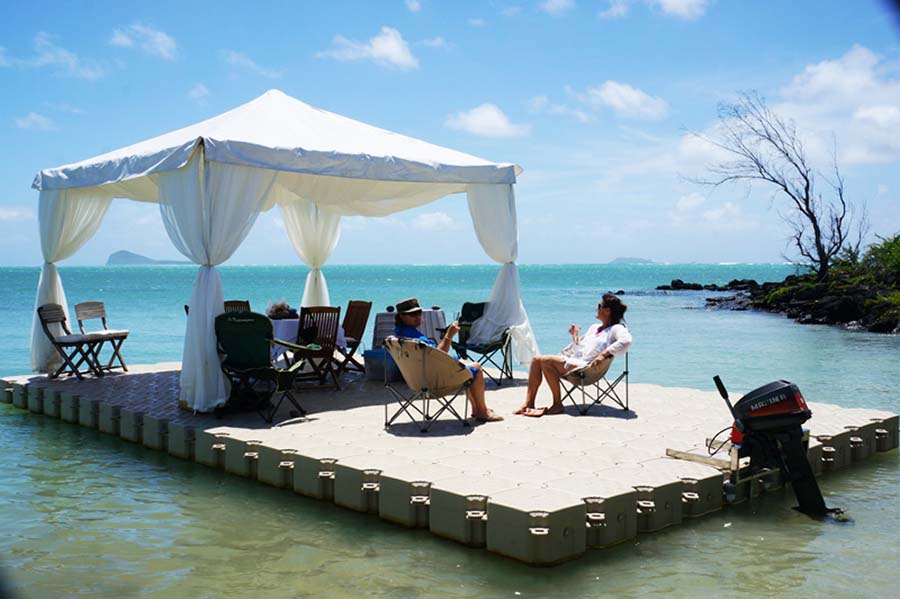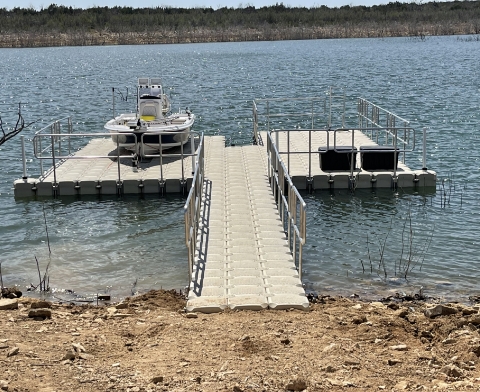Maximizing Your Outdoor Room with Specialized Floating Dock Providers
Maximizing Your Outdoor Room with Specialized Floating Dock Providers
Blog Article
Floating Docks: The Perfect Choice for Versatile Water Access
Floating docks existing a compelling service for a variety of water accessibility needs, providing adaptability that transcends conventional mooring options. The modular nature of floating docks assists in personalization, catering to details demands.
Benefits of Floating Docks
Floating docks deal many advantages that boost water gain access to for different applications. Their ability to rise and drop with altering water levels makes them specifically useful in atmospheres with fluctuating trends or seasonal variations. This flexibility makes sure that vessels can quickly moor without problem for the water's depth, giving a reliable system for recreational, commercial, and industrial usages.
Additionally, floating docks are usually constructed from resilient products that stand up to corrosion, making them ideal for lasting usage in marine settings. Their installment is generally less intrusive than typical set docks, lowering the environmental impact and assisting in quicker deployment (floating dock builder). This flexibility allows for much easier relocation or reconfiguration according to user requirements or ecological modifications
Security is an additional key advantage; floating docks can supply steady access for individuals boarding or getting off from watercrafts and reduce the threat of crashes related to unstable surfaces. Moreover, they can be developed to suit a range of accessories, such as fenders and cleats, enhancing performance. In general, floating docks represent a reliable service for enhancing water access throughout varied fields while advertising security and environmental sustainability.

Types of Floating Docks
Numerous sorts of floating docks provide to different needs and settings, each developed with specific attributes to maximize capability. One of the most typical kinds consist of modular docks, which consist of interlacing areas that enable simple personalization and growth. These docks are ideal for leisure usage, as they can be customized to fit numerous boat sizes and water problems.
An additional popular choice is the stationary floating dock, which remains anchored in position but floats with changing water levels. dock company. This type is specifically matched for areas with very little tidal variations, giving steady access for angling or swimming. Furthermore, there are drive-on docks, which feature a sloped design that enables boats to conveniently drive on and off, making them appropriate for individual watercraft and smaller sized vessels
For industrial applications, heavy-duty floating docks are readily available, constructed from reinforced materials to withstand significant loads and severe marine atmospheres. Finally, environmentally friendly floating docks make use of lasting products and styles to lessen environmental effect, commonly incorporating features like greenery to support local wild animals. Understanding the various sorts of floating docks guarantees that individuals can select the most proper remedy for their particular demands.
Installation Process Introduction
A successful installation of floating docks requires mindful preparation and attention to information to make certain ideal efficiency and safety. The first step entails analyzing the website problems, including water depth, present, and prospective challenges. This evaluation informs the choice of the appropriate dock materials and layout customized to the details atmosphere.
Following, getting essential licenses is crucial, as many territories have laws pertaining to building and construction on water bodies. When permissions are secured, web link the setup can continue. Begin by preparing the foundation, which might involve anchoring systems or pilings tailored to the dock kind and neighborhood conditions.
Complying with the structure configuration, put together the dock areas according to maker specifications. Make sure that all components are firmly attached and lined up to endure environmental anxieties. Setting the dock in the marked area, ensuring it is level and floating docks stable.

Upkeep Tips and Finest Practices
After the setup procedure is total, recurring upkeep plays a vital function in ensuring the durability and capability of floating docks. Regular examinations must be performed to identify any indicators of damage, wear and tear, or wear - floating docks. Look for any loose installations, fractures, or splitting up in the dock sections, as these can compromise structural stability
Cleaning up the dock is necessary to remove particles, algae, and other accumulation that can influence its look and safety. Use a gentle stress wash regularly to maintain cleanliness without causing damage to the surface. In addition, applying a safety sealer every couple of years can aid boost longevity and stand up to ecological wear.
Take note of the mooring lines and anchors, ensuring they are cost-free and protected from deterioration. Replace any kind of abject elements quickly to avoid hazards. Seasonal adjustments may also be needed; throughout extreme climate condition, repositioning or strengthening the dock can stop damage.
Applications for Floating Docks
Floating docks offer a plethora of applications, catering to both business and leisure demands. In recreational setups, they supply seamless accessibility to waterways for activities such as boating, fishing, and swimming. Their adjustable nature allows for installation in varying water degrees, making sure steady and risk-free gain access to despite tidal changes.
Readily, floating docks are indispensable over at this website for marinas and waterfront organizations. They promote the docking of vessels, making it possible for reliable dumping and loading of products. Their modular layout permits simple development or reconfiguration to fit altering company needs, making them excellent for watercraft leasings, tour procedures, or fishing charters.
Additionally, floating docks are used in environmental applications such as aquatic research study and habitat remediation. They can function as platforms for clinical research studies, keeping track of water quality, or performing wildlife studies without disturbing sensitive environments.
In industrial contexts, floating docks are utilized in building and construction jobs, providing accessibility to hard-to-reach areas for tools and workers. Their flexibility, longevity, and very little effect on the atmosphere make them an optimal selection for a variety of applications, enhancing both capability and access in different water-based environments.
Verdict
In verdict, floating docks represent an ideal service for diverse water gain access to needs, owing to their versatility, resilience, and modular layout. Floating docks serve as a useful asset for recreational, industrial, and ecological tasks, making certain dependable accessibility to waterways and promoting sustainable techniques in marine environments.
Floating docks existing a compelling remedy for a variety of water accessibility needs, offering versatility that transcends standard mooring alternatives.Floating docks offer many advantages that enhance water access for numerous applications. On the whole, floating docks represent a reliable solution for improving water access throughout diverse industries while advertising safety and environmental sustainability.
An additional prominent alternative is the fixed floating dock, which remains secured in area however floats with altering water levels.In conclusion, floating docks stand for an optimal service for varied water access needs, owing to their versatility, toughness, and modular layout.
Report this page